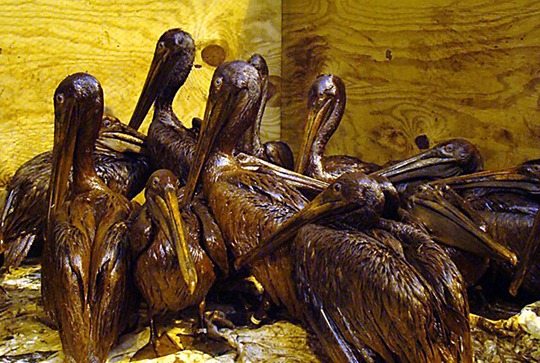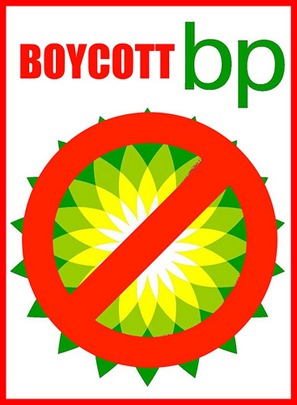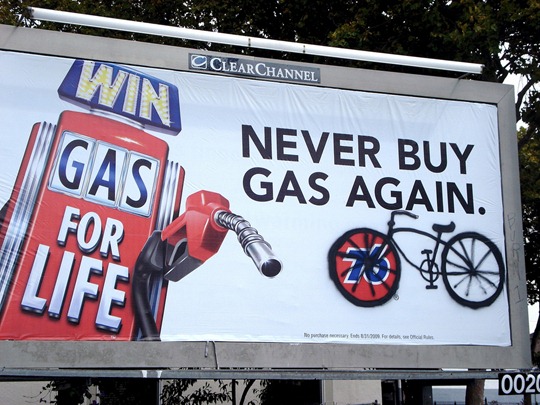Photo courtesy of IBRRC on Flickr
I am responsible for the Gulf of Mexico Oil Spill. I claim responsibility for the 11 deaths, 17 injuries from the explosion, and the millions of marine and wildlife that have been killed or displaced as a result.
Yes, I am responsible for releasing an estimated 1.9 million to 16 million litres of oil into the ocean every day since April 20th.
AND SO ARE YOU…
We brought this on ourselves – me and you. Our addiction to automobiles, cheap gas, plastic, cheap food and big houses has led to this disaster and will lead to future disasters if we don’t change our path.
Many people are furious about the oil spill and are solely blaming British Petroleum (BP) for this disaster – some even calling for a boycott.
Photo by Rusty Boxcars on Flickr
But boycotting BP is not the solution – BP might not even exist after this nightmare is all over. We North Americans always try to blame someone else for problems WE cause.
I will repeat: YOU ARE RESPONSIBLE. I AM RESPONSIBLE. WE ARE RESPONSIBLE. Denying it will only lead to more disasters in the future.
Am I happy with BP’s negligence? No. But is buying gas from Exxon instead of BP going to solve this problem? No.
BP, Exxon and other oil companies are out there for you and me, and for everyone else who consumes oil.
In North America, we have built cities around automobiles – and hundreds of millions of automobiles require billions of gallons of oil to operate. In fact, the number of vehicles in the United States (~254.4 million) outnumbers licensed drivers.
Those oil-covered birds didn’t deserve this. They weren’t the ones driving SUVs, living in big suburban houses, driving big motor boats, and watching air shows. No, WE did this, and WE deserved this – they didn’t.
Frankly, I’m sick of people complaining about how the oil spill is going to affect the economy. The economy won’t matter if we don’t change our ways.
A recent article that contains photos of the birds affected by this disaster has garnered close to 3,000 comments so far. Most comments are sympathetic to the poor birds – a few called for a boycott on BP, and a small minority claim that “nature will fix this”, because “nature made this”.
Some of the more sympathetic comments were concerned people asking what they can do to change their life to help reduce our dependency on fossil fuels.
Well, my first suggestion is obvious to those who regularly read this website. This brilliant United States billboard graffiti says it all:
Photo courtesy of Craig C. on Flickr
Although a bicycle is a very practical solution to our addiction to oil, it’s not the only solution. Here is a list of other suggestions of things we can change in our lives to reduce our dependency on oil:
-
Live closer to your workplace – in a smaller home if necessary
-
Ride your bike to your work or to the train station if you commute by train
-
Eat less meat, buy food made closer to your home
-
Ride your bike or walk to the corner store instead of driving
-
Consider taking vacations closer to home instead of flying long distances
-
If you do travel far, purchase premium offsets
-
Turn the heat down in the winter, and the A/C down in the summer
-
Trade your motor boat in for a canoe or a kayak
-
Trade your SUV in for a small car, metro pass, or a bike
-
Use reusable grocery bags instead of plastic bags
I challenge you to choose 3 items from this list that you aren’t already doing, and start now.
If every person in North America each started 3 doing things in this list, we could significantly reduce our oil consumption and start to create demand for renewable energy, bike infrastructure, public transit, high-speed electric trains, and other initiatives that will make it easier to change your lifestyle and leave our children with a better world.
We all created this problem, so let’s all “be the change”.
James D. Schwartz is the editor of The Urban Country. You can contact James at james.schwartz@theurbancountry.com.
Related Articles:
- $1.30/litre for gas? Who cares? (May 2008)
- United States Moving Forward After Decades of Neglect (March 2010)
- Living Off the Grid (July 2009)
- Copenhagen 2009 – We Have Ourselves to Blame (Dec 2009)





I never realized how many of those on your list I already do.
I work from home, however I live within 10km of everything I possibly need. Average commute to stores is 5km.
The only meat I eat now would be fish meat. I haven’t touched red meat in years.
In the winter I haven’t used the furnace in about six years now. I just use a little space heater for my room. Other than that I put on extra clothing.
If I did go into the water, I would use a canoe or kayak.
The two things I’m guilty on is living in a slightly larger house and not always using reusable bags.
Sometimes I forget to take my reusable bags with me, however most stores now charge for plastic bags, so I don’t bother using a bag at all.
As for my house. It’s a semi-back split, perhaps around 900-1000sqft.
At the moment there is nothing I can do about it. I’m going to be moving out West to BC within a year. Good chance simply because of the high cost of housing I will end up in a condo there, which I do sort of look forward to because I do get tired of yard work.
While I agree that our economy that is dependent on the availability of cheap oil is to blame, I don’t feel as culpable as perhaps others should.
I haven’t eaten meat in over 10 years, I don’t own a car and haven’t driven one in over 10 years, my apartment is powered by renewable energy, I get most of my food from my CSA and food co-op, I bike and walk, I usually take the train when I travel, and I am trying to remove all plastic from new purchases (much easier said than done). I didn’t make these changes overnight but am steadily working to use less resources.
So, yeah – I blame BP and excessive consumption a lot more than I blame myself.
Good advice, but the horror show will go on. If there is anything people are bad at it’s helping with other people’s problems. In Canada, this for sure is viewed as somebody else’s problem. Same with the tar sands. They make good news but, Joe the plumber will turn off the images of oil soaked dead pelicans and what not and then drive his SUV to the corner. After all it’s not his problem because it’s not in his face right now and you can’t put it in his face until it happens next door and even then… It’s the same with climate change – just some nebulous thing out there floating around like an oil slick. Maybe the people in Louisiana will follow all your steps, but i doubt it… exxon valdez didn’t slow oil consumption either will this. Par for the course i’m afraid.
Ryan, great to hear you are already on board. It sounds like you are already doing a lot to eliminate dependence on oil.
Kim, I think you would agree that you are a very small minority of people who are doing great things to reduce our dependence on oil (among other positive things as a result).
The article is targeted more to people who haven’t taken such drastic measures as of yet.
I am somewhere in the middle – I am doing pretty much everything in my list, but I still eat meat, I drive once in a while, and my condo building doesn’t specifically buy renewable energy. But I bike almost everywhere I go, use a kayak, and I live small, so my footprint is only a fraction of the average North American. I still have a lot more I can do, but other people have a lot further to go than I do.
@Anonymous – I agree that a lot of people will continue to go about their lives without any changes as a result of this. But I do think that in general people are more conscious of their personal impact now than in 1989 when the Exxon Valdez spilled oil.
It is that reason that I hope that the movement will gradually become mainstream. It may still take a long time, but unfortunately it takes disasters like this for people to open their eyes.
Who knows, maybe the next oil spill will happen in Canada, and that might cause Canadians to re-think their values.
But at the same time, the target audience for this website isn’t just in Canada, so hopefully this message isn’t divided by borders.